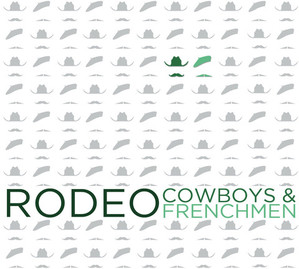
“Rodeo” does just that by incorporating Pop, R &B and Folk to enhance the Jazz. And if John Coltrane could cover “My Favorite Things” from The Sound of Music, then Cowboys and Frenchmen can do “Man of Constant Sorrows” from O Brother, Where Art Thou?
The album opens with “Jazz Styles.” The gongs, cymbals and bamboo flutes herald the coming of something cool. Matt Honor’s drums kick in in earnest with Ethan O’Reilly’s bass. Chris Ziemba adds the staccato piano. Ethan Helm (alto sax, flute and clarinet) and Owen Broder (alto sax, clarinet and bass clarinet) jump aboard and we got the makin’s.
The piece is composed by Ethan Helm and it is a brilliant nod and a wink to the New York Jazz scene. What is clear from the very beginning is that each musician deserves rapt attention. These guys burn it down.
Owen Broder wrote “King Barry.” The piano arpeggios with the andante bass paint a pastoral scene that serves as a gorgeous backdrop to Broder’s alto sax solos.
The chord changes are magnificent. A thing of rare beauty. The composition is imaginative, emotional and flawlessly executed.
“A Bridge Inside My Mind” is from the pen of Ethan Helm. The free-styling introduction from all five artists weaves in and out through the piano solos as the bass and drums develop a solid undercurrent. The track closes with the return of the free-style.
“Because” (Lennon-McCartney) is the meditative bit of melancholy that we have loved forever. The arrangement is not far from the original but the intonation of the horns and the shuffle of the drums do change the feel but without diminishing the beauty of the song. Of course, like all who listened to Abbey Road hundreds of times, I expected “You Never Give Me Your Money” to follow next.
What does follow is Owen Broder’s arrangement of the “old timey” folk song, “Man of Constant Sorrows.” Ziemba’s piano works off of the main theme in great improvisation. Ethan O’Reilly and Matt Honor create a traveling sense that is spot on.
The main theme is revisited and reworked into a fine piece of straight-up Jazz. The arrangement won Broder the 2015 Downbeat Student Award for “Best Master’s Arrangement.”
“Brode’s Abode” (by Owen Broder) opens with the duo of Broder and Helm on the horns. The others soon join in and the cool Jazz takes off.
O’Reilly and Honor with Ziemba contribute stellar rhythms and drive as the horns play for cover. When Ziemba solos, he makes splendid use of the space.
The writing of “Brode’s Abode” is worthy of admiration. A cool groove, nice changes and sweet melody throughout.
“More” by Ethan Helm follows with its tightness and precision. A surprising roar from the artists bring a smile with a monster rhythm section that buries you. The frontal assault of Helm and Broder is furious. The final minute of the song is something not soon forgotten.
“Bells of Mindfulness” (Owen Broder) is drawn from the practice of Buddhism. All of the artists contribute brilliantly. The song’s (and album’s) conclusion is meditative, leaving us to ponder the wonder of what we have just heard.
This is my kind of album. It is innovative as well as inspiring. Eclectic and emotional. The artistry of the quintet is exemplary. For Cowboys and Frenchmen, it is their debut album. For us, it is the start of something wonderful.
 RSS Feed
RSS Feed
